Filter by

Tanya Jawab Hukum Waris & Anak
Buku Tanya Jawab Hukum Waris & Anak menyajikan penjelasan praktis mengenai berbagai persoalan yang sering muncul dalam bidang hukum keluarga, khususnya terkait dengan pembagian harta warisan dan status hukum anak.
- Edition
- -
- ISBN/ISSN
- 978-602-962-967-5
- Collation
- 21 cm x 14 cm
- Series Title
- -
- Call Number
- 346.052
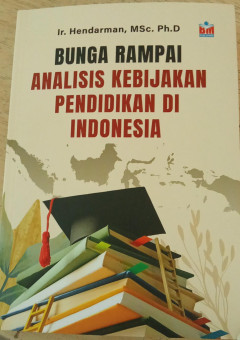
Bunga Rampai Analisis Kebijakan Pendidikan Di Indonesia
Buku Bunga Rampai Analisis Kebijakan Pendidikan di Indonesia menyajikan kumpulan tulisan yang membahas berbagai isu, strategi, dan dinamika kebijakan pendidikan di tanah air. Setiap artikel dalam buku ini menyoroti aspek berbeda, mulai dari perumusan kebijakan, implementasi di lapangan, hingga evaluasi terhadap dampak yang ditimbulkan bagi peserta didik, tenaga pendidik, maupun masyarakat luas.…
- Edition
- -
- ISBN/ISSN
- 978-623-6025-32-1
- Collation
- 14,8 cm x 21 cm
- Series Title
- -
- Call Number
- 379.598 BUN

Pendidikan Karakter Era Milenial
Buku Pendidikan Karakter Era Milenial karya Hendarman membahas secara komprehensif tentang pentingnya pendidikan karakter dalam menghadapi tantangan zaman modern. Di era milenial yang ditandai dengan derasnya arus informasi, perkembangan teknologi digital, serta pergeseran nilai sosial, pendidikan karakter menjadi fondasi utama untuk membentuk generasi yang berintegritas, berakhlak mulia, dan m…
- Edition
- -
- ISBN/ISSN
- 9786204463656
- Collation
- 25 x 17.5 cm
- Series Title
- -
- Call Number
- 370.114

aku seorang introver
- Edition
- 1
- ISBN/ISSN
- 978-623-01-0427-5
- Collation
- 201 hal
- Series Title
- -
- Call Number
- 374 ICA
- Edition
- 1
- ISBN/ISSN
- 978-623-01-0427-5
- Collation
- 201 hal
- Series Title
- -
- Call Number
- 374 ICA

"Brightening Language Skills:Menggali Kebutuhan Peningkatan Kemampuan Berbaha…
- Edition
- -
- ISBN/ISSN
- -
- Collation
- 26cm X 16cm
- Series Title
- Pedoman
- Call Number
- 372.65BRI
- Edition
- -
- ISBN/ISSN
- -
- Collation
- 26cm X 16cm
- Series Title
- Pedoman
- Call Number
- 372.65BRI
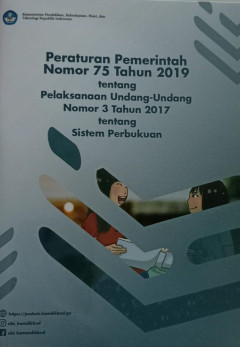
Peraturan Pemerintah Nomor 75 Tahun 2019
- Edition
- -
- ISBN/ISSN
- -
- Collation
- 15cm X 10,5cm
- Series Title
- Pedoman
- Call Number
- 349.99523PEM
- Edition
- -
- ISBN/ISSN
- -
- Collation
- 15cm X 10,5cm
- Series Title
- Pedoman
- Call Number
- 349.99523PEM

Undang-Undang Nomor 3 Tahun 2017 tentang Sistem Perbukuan
- Edition
- -
- ISBN/ISSN
- -
- Collation
- 15cm X 10,5cm
- Series Title
- Pedoman
- Call Number
- 349.99523UND
- Edition
- -
- ISBN/ISSN
- -
- Collation
- 15cm X 10,5cm
- Series Title
- Pedoman
- Call Number
- 349.99523UND

Peraturan Menteri Pendidikan Kebudayaan, Riset, dan Teknologi Nomor 22 Tahun …
- Edition
- -
- ISBN/ISSN
- -
- Collation
- 15cm X 10,5cm
- Series Title
- Pedoman
- Call Number
- 349.99523PER
- Edition
- -
- ISBN/ISSN
- -
- Collation
- 15cm X 10,5cm
- Series Title
- Pedoman
- Call Number
- 349.99523PER

1001 Series Topical Questions
1001 Series Topical Questions menyajikan kumpulan pertanyaan topikal yang dirancang untuk merangsang diskusi, refleksi, dan interaksi dalam berbagai konteks—baik edukatif, sosial, maupun interpersonal. Pertanyaan-pertanyaan ini terbagi menurut kategori tema umum seperti tren sosial, pengalaman pribadi, preferensi, imajinasi, dan isu kontemporer.
- Edition
- -
- ISBN/ISSN
- 978-967-5051-77-7
- Collation
- 27cm X 21cm
- Series Title
- -
- Call Number
- 371.33SCI
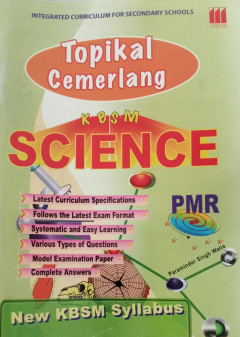
Topikal Cemerlang KBSM SCIENCE
Buku Topikal Cemerlang KBSM Science merupakan buku latihan sains berbentuk topikal yang dirancang sesuai dengan struktur dan tema dalam buku teks KBSM. Ditujukan untuk pelajar sekolah menengah
- Edition
- -
- ISBN/ISSN
- 978-983-3864-87-4
- Collation
- 25cm X 18cm
- Series Title
- -
- Call Number
- 371.33TOP

Melukis Wajah Pendidikan Indonesia (Kiat Sukses Implementasi Kurikulum 2013)
Buku Melukis Wajah Pendidikan Indonesia menyajikan panduan strategis dan reflektif untuk implementasi Kurikulum 2013. Ditujukan bagi para guru, kepala sekolah, dan pemangku kepentingan pendidikan
- Edition
- -
- ISBN/ISSN
- 978-602-7629-85-1
- Collation
- 20,5cm X 14cm
- Series Title
- -
- Call Number
- 375MEL

Multitest Question Bank 1500 Science
Buku Multitest Question Bank merupakan kumpulan soal-soal latihan yang dirancang untuk membantu peserta didik mempersiapkan diri menghadapi berbagai jenis ujian, baik ujian sekolah, ujian masuk perguruan tinggi, maupun tes standar lainnya.
- Edition
- -
- ISBN/ISSN
- 978-967-5101-00-7
- Collation
- 27 cm x 21 cm
- Series Title
- -
- Call Number
- 371.26 SCI
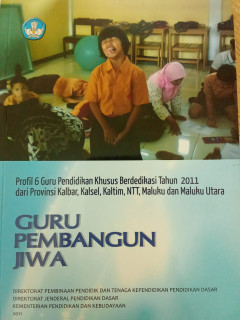
Guru Pembangun Jiwa
Buku Guru Pembangun Jiwa menyoroti peran mendalam seorang guru tidak hanya sebagai pengajar, tetapi juga sebagai pembimbing, pembentuk karakter, dan penjaga nilai-nilai kemanusiaan dalam diri siswa.
- Edition
- -
- ISBN/ISSN
- -
- Collation
- 20 cm x 15 cm
- Series Title
- -
- Call Number
- 371.1 JIW
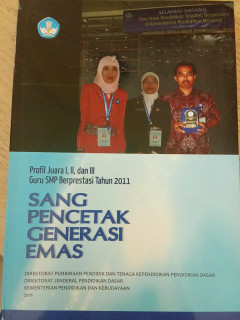
Sang Pencetak Generasi Emas
Buku Sang Pencetak Generasi Emas mengangkat kisah dan peran inspiratif para pendidik dalam membentuk generasi masa depan yang unggul, berkarakter, dan berdaya saing tinggi.
- Edition
- -
- ISBN/ISSN
- -
- Collation
- 20 cm x 15 cm
- Series Title
- -
- Call Number
- 371.1SAN
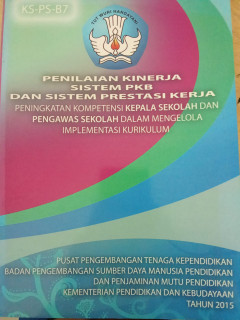
Penilaian Kinerja Sistem PKB dan Sistem Presentasi Kerja
Buku Penilaian Kinerja Sistem PKB dan Sistem Presentasi Kerja membahas secara komprehensif konsep, indikator, dan mekanisme evaluasi kinerja guru dalam kerangka Pengembangan Keprofesian Berkelanjutan (PKB). Buku ini mengulas bagaimana sistem penilaian dirancang untuk mendorong peningkatan kompetensi pedagogik, profesional, sosial, dan kepribadian guru.
- Edition
- -
- ISBN/ISSN
- -
- Collation
- 29 cm x 20 cm
- Series Title
- -
- Call Number
- 371.144 PEN

Apa Yang Harus Dilakukan Guru?
Buku Apa Harus Dilakukan Guru menyajikan panduan praktis dan reflektif mengenai peran, tanggung jawab, dan strategi yang perlu dijalankan oleh guru dalam menjalankan tugas profesionalnya. Buku ini membahas berbagai aspek penting dalam profesi keguruan, mulai dari perencanaan pembelajaran, manajemen kelas, penilaian hasil belajar, hingga pembentukan karakter siswa. Selain itu, buku ini menyoroti…
- Edition
- Volume VII No 119
- ISBN/ISSN
- 0125-9784
- Collation
- 28 cm x 21 cm
- Series Title
- Volume VII No 119 Tahun 2007
- Call Number
- 371.1 ALA

Mengukir Guru IPA di Indonesia
Majalah Mengukir Guru IPA di Indonesia menyajikan refleksi mendalam mengenai pembangunan profesionalisme guru IPA melalui pendekatan pedagogik, kecakapan instruksional, dan penguatan sikap keilmuan. Setiap edisi berisi kumpulan artikel
- Edition
- -
- ISBN/ISSN
- -
- Collation
- 23,5cm X 15,5cm
- Series Title
- Majalah
- Call Number
- 371.1MEN

Pengembangan Alat Peraga IPA Dalam Pembelajaran
Majalah Pengembangan Alat Peraga IPA dalam Pembelajaran menyoroti inovasi dan praktik dalam desain serta pemanfaatan alat peraga sebagai media pembelajaran IPA.
- Edition
- -
- ISBN/ISSN
- -
- Collation
- 23,5cm X 15,5cm
- Series Title
- Majalah
- Call Number
- 371.33PEN

Pengembangan,Implementasi,dan Review Kurikulum IPA pada Pendidikan Dasar dan …
Buku ini membahas secara komprehensif proses pengembangan, implementasi, dan evaluasi kurikulum Ilmu Pengetahuan Alam (IPA) pada jenjang pendidikan dasar dan menengah.
- Edition
- Edisi Tahun 1999-2000
- ISBN/ISSN
- 0125-9784
- Collation
- 29 cm x 21 cm
- Series Title
- -
- Call Number
- 375.00507 MAJ
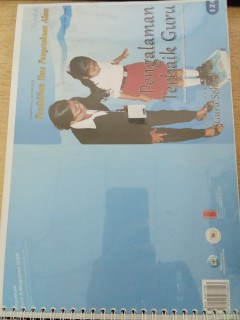
Pengalaman Terbaik Guru
Buku Pengalaman Terbaik Guru memuat kisah-kisah inspiratif dari para pendidik yang membagikan pengalaman berharga selama menjalankan tugas sebagai guru. Setiap cerita mencerminkan tantangan, keberhasilan, dan pembelajaran yang mereka alami dalam proses mendidik, membimbing, dan membentuk karakter siswa.
- Edition
- Volume X No 124
- ISBN/ISSN
- 0125-9784
- Collation
- 29 cm x 21 cm
- Series Title
- Volume X No 124/Mei 2010
- Call Number
- 371.1 GUR

PETUNJUK TEKNIS (Program Pengembangan Keprofesian Berkelanjutan)
Pedoman ini menyajikan instrumen teknis pelaksanaan Program PKB melalui pendekatan zonasi guna meningkatkan mutu pembelajaran di Indonesia. Tujuan utamanya adalah mendukung kualitas proses belajar mengajar melalui Program PKP yang berorientasi pada keterampilan berpikir tingkat tinggi (HOTS), serta pemerataan mutu pendidikan secara regional. Strategi zonasi diterapkan melalui pengelolaan lembag…
- Edition
- -
- ISBN/ISSN
- -
- Collation
- 29cm X 20,5cm
- Series Title
- Pedoman
- Call Number
- 375.001PET
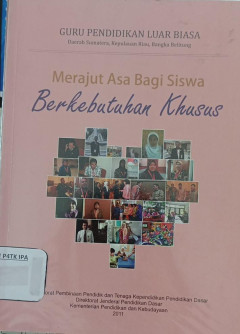
Merajut Asa Bagi Siswa Berkebutuhan Khusus
- Edition
- -
- ISBN/ISSN
- -
- Collation
- 73 hal
- Series Title
- -
- Call Number
- 371.9 DIR
- Edition
- -
- ISBN/ISSN
- -
- Collation
- 73 hal
- Series Title
- -
- Call Number
- 371.9 DIR

Pedoman Modis Pisan (Mobil Pendidikan Semua Pintar Sains)
- Edition
- -
- ISBN/ISSN
- -
- Collation
- 29cm X 21cm
- Series Title
- Pedoman
- Call Number
- 371.2PED
- Edition
- -
- ISBN/ISSN
- -
- Collation
- 29cm X 21cm
- Series Title
- Pedoman
- Call Number
- 371.2PED

Petunjuk Teknis Modis Pisan (Mobil Pendidikan Semua Pintar Sains)
- Edition
- -
- ISBN/ISSN
- -
- Collation
- 29cm X 21cm
- Series Title
- Pedoman
- Call Number
- 370.19PET
- Edition
- -
- ISBN/ISSN
- -
- Collation
- 29cm X 21cm
- Series Title
- Pedoman
- Call Number
- 370.19PET

Laporan Pelaksanaan Kegiatan Modis Pisan (Mobil Pendidikan Semua Pintar Sains)
- Edition
- -
- ISBN/ISSN
- -
- Collation
- 29cm X 21cm
- Series Title
- Pedoman
- Call Number
- 370LAP
- Edition
- -
- ISBN/ISSN
- -
- Collation
- 29cm X 21cm
- Series Title
- Pedoman
- Call Number
- 370LAP

Progress Report 2009-2010 SEAMEO Regional Centre Qitep In Science
Laporan ini mencakup kegiatan dan pencapaian SEAMEO QITEP in Science selama periode 2009–2010, dengan fokus pada peningkatan kompetensi tenaga pendidikan sains di kawasan Asia Tenggara. Materi yang dilaporkan meliputi pelatihan guru IPA berbasis inquiry‑based science education (IBSE), pengembangan perangkat pembelajaran sains, kolaborasi regional antar negara anggota SEAMEO, serta penelitia…
- Edition
- -
- ISBN/ISSN
- -
- Collation
- 29 cm x 21 cm
- Series Title
- Pedoman
- Call Number
- 371.334

Pedoman Pemilihan Widyaiswara Berprestasi Di Lingkungan Kementrian Pendidikan…
Pedoman ini disusun sebagai acuan dalam menyelenggarakan pemilihan widyaiswara berprestasi di lingkungan Kementerian Pendidikan dan Kebudayaan. Tujuannya adalah mendorong peningkatan kualitas, motivasi, dan profesionalisme widyaiswara melalui penilaian berbasis kinerja dan prestasi.
- Edition
- -
- ISBN/ISSN
- -
- Collation
- 29 cm x 21 cm
- Series Title
- -
- Call Number
- 371.144

Rekomendasi Workshop Integrasi STEM dalam Implwmwntasi Kurikulum 2013
Dokumen ini disusun sebagai panduan pelaksanaan workshop yang bertujuan untuk meningkatkan kompetensi guru dalam mengintegrasikan pendekatan STEM (Science, Technology, Engineering, and Mathematics) ke dalam pembelajaran berbasis Kurikulum 2013
- Edition
- -
- ISBN/ISSN
- -
- Collation
- 29 cm x 21 cm
- Series Title
- -
- Call Number
- 371.144

How Computers Entered The Classroom, 1960-2000 Historical Persperctives
This open‑access edited volume addresses a major gap in the history of education by tracing how computers were introduced into European classrooms between 1960–2000. Through ten case studies and thematic chapters, it examines the roles of key actors—politicians, industry, teachers, and students—as well as the impact of political rationales, ideologies, and organizational structures.
- Edition
- Volume 2
- ISBN/ISSN
- 978-3-11-078014-7
- Collation
- 247 page
- Series Title
- -
- Call Number
- 371.334094
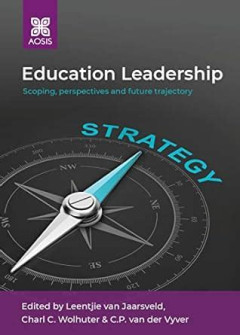
Education Leadership
Educational leadership has a demonstrable and significant impact on school success and student achievement. This volume captures the breadth of scholarship in educational leadership through diverse research contributions focusing on teacher leadership, school leadership, and mid‑level roles.
- Edition
- -
- ISBN/ISSN
- 978-1-77995-223-3
- Collation
- 266 page
- Series Title
- -
- Call Number
- 371.2
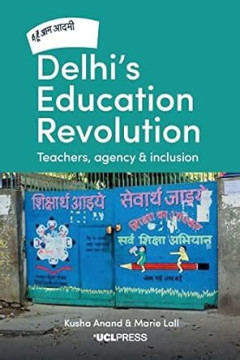
Delhi's Education Revolution Teachers, Agency & Inclusion
- Edition
- -
- ISBN/ISSN
- -
- Collation
- 211 page
- Series Title
- -
- Call Number
- 371.26
- Edition
- -
- ISBN/ISSN
- -
- Collation
- 211 page
- Series Title
- -
- Call Number
- 371.26

Transforming University-Based Teacher Education Through Innovation
This edited volume, based on a decade of innovation driven by Norway’s ProTed (Centre for Professional Learning in Teacher Education), maps the future of university-based teacher education. It synthesizes cutting‑edge practices and empirical findings aimed at transforming teacher training programmes. Key themes include: integrated programme design for coherence across years; building univer…
- Edition
- -
- ISBN/ISSN
- 978-1-032-66789-8
- Collation
- 263 page
- Series Title
- -
- Call Number
- 374.2

Changing Higher Education For A Changing World
Drawing on research from the Centre for Global Higher Education (CGHE)—the world’s largest social science research centre focused on higher education—this open access volume (published December 2023 / early 2022) critically examines how global higher education systems are changing.
- Edition
- -
- ISBN/ISSN
- 978-1-3501-0842-4
- Collation
- 289 page
- Series Title
- -
- Call Number
- 378.23
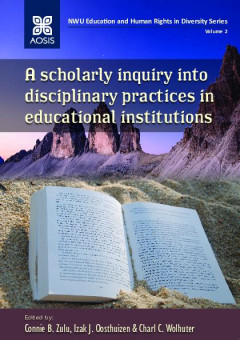
A scholarly inquiry into disciplinary practices in educational institutions
This edited volume presents original research on discipline and disciplinary practices in various educational institutions—from schools to tertiary settings. It offers a scientific and scholarly perspective by integrating empirical and philosophical approaches—quantitative (positivist), qualitative (interpretive), and mixed methods (pragmatic)—to investigate discipline issues in contexts …
- Edition
- Volume 2
- ISBN/ISSN
- 978-1-928523-15-4
- Collation
- 362 page
- Series Title
- -
- Call Number
- 370.15
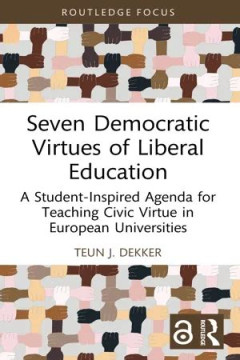
Seven Democratic Virtues of Liberal Education
This book argues that the Liberal Arts and Sciences (LAS) model of education can inspire reform across higher education to help students acquire crucial civic virtues. Based on interviews with 59 students from LAS programmes across Europe, it demonstrates how LAS education cultivates essential citizenship skills for democratic engagement. From these insights, Dekker identifies seven key democra…
- Edition
- -
- ISBN/ISSN
- 978-1-032-36921-1
- Collation
- 134 page
- Series Title
- -
- Call Number
- 370.115

Brian Simon and the Struggle for Education
This pioneering biography examines the life and career of Brian Simon (1915–2002), a prominent Marxist intellectual and historian of education in 20th-century Britain. Drawing on newly available archives, it explores his diverse roles—as student, soldier, schoolteacher, Communist Party activist, academic, and reformer—and closely analyzes how his Marxist convictions shaped his contributio…
- Edition
- -
- ISBN/ISSN
- 978-1-78735-983-3
- Collation
- 206 page
- Series Title
- -
- Call Number
- 370.92
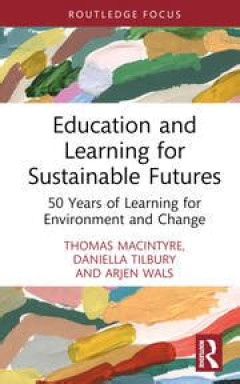
Educating and Learning for Sustainable Futures
This volume critically traces the evolution of environmental and sustainability education over the past five decades. Beginning with the 1972 UN Conference on the Human Environment and moving through to the 2020s, it examines how educational approaches—shaped by global events and sustainability discourses—have succeeded or fallen short in effecting meaningful change. Through historical and …
- Edition
- -
- ISBN/ISSN
- 978-1-032-72791-2
- Collation
- 135 page
- Series Title
- -
- Call Number
- 363.7007
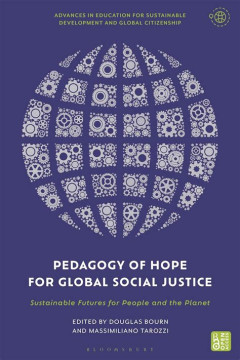
Pedagogy of Hope For Global Social Justice
Following Paulo Freire’s “pedagogy of hope,” this open-access volume explores hope as an educational approach to addressing global challenges—such as climate change, racism, and the COVID‑19 pandemic. It presents a conceptual framework for global citizenship and environmental education, authored by scholars across 12 countries. Case studies range from teacher training in Latin America…
- Edition
- -
- ISBN/ISSN
- 978-1-3503-2628-6
- Collation
- 289 page
- Series Title
- -
- Call Number
- 370.115

Partnership Between Universities in Japan and South Africa
Cross-border partnerships are increasingly important in twenty-first-century higher education. Despite many universities pursuing international collaborations, there has been no comprehensive synthesis of models and case studies to guide such efforts. This book addresses that gap by presenting diverse partnerships between Japanese and South African universities. Through multiple case studies, i…
- Edition
- -
- ISBN/ISSN
- 978-1-7764893-5-0
- Collation
- 280 page
- Series Title
- -
- Call Number
- 378.19

Joint Modules and Internationalisation in Higher Education
This volume examines the development of the Joint Module "Comparative Studies in Adult Education and Lifelong Learning" (COMPALL) within the context of international trends in higher education and adult education. It discusses the module's institutional and didactical structures, as well as the motivations and diversity of its participants. The book is divided into three parts: (1) Internationa…
- Edition
- Volume 71
- ISBN/ISSN
- 978-3-631-73641-8
- Collation
- 204 page
- Series Title
- -
- Call Number
- 370.948

Theorising Research, Innovation and Internationalisation in African Higher Ed…
This book delves into the evolving landscape of African higher education, examining the complex interplay between research, innovation, and internationalisation. It addresses the challenges and opportunities shaped by colonial legacies, globalisation, decolonisation, and the COVID-19 pandemic. The volume highlights the significant contributions of African scholars to global higher education and…
- Edition
- -
- ISBN/ISSN
- 978-1-7764474-5-9
- Collation
- 402 page
- Series Title
- -
- Call Number
- 370.967

Raising The Impact Of Education Research In Africa
his scholarly volume addresses the low demonstrable effect of education research in South Africa and Africa, focusing on recommendations from scholars in various educational sub-fields. It revisits the history of research outcomes and offers informed recommendations based on in-depth investigations and analyses. The book aims to stimulate scholarly discussion on increasing the recording of the …
- Edition
- -
- ISBN/ISSN
- 978-1-928396-80-2
- Collation
- 442 page
- Series Title
- -
- Call Number
- 370.967
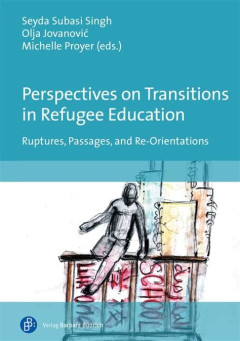
Perspectives on Transitions in Refugee Education
This open-access volume examines the multifaceted transitions refugees encounter—individual, social, and cultural—and their intersections with educational experiences. Drawing on studies from diverse national contexts, the book explores the complex relationships between individuals, culture, society, and institutions. By analyzing these transitional processes, the work aims to deepen unders…
- Edition
- -
- ISBN/ISSN
- 978-3-8474-1786-6
- Collation
- 266 page
- Series Title
- -
- Call Number
- 371.9

Self-Directed Learning Curriculum implementation, praxis and scholarship in …
This open-access scholarly volume offers an in-depth analysis of self-directed learning (SDL) across curriculum design, teaching practice, and academic research. Drawing on a wide range of original studies, it highlights how SDL can be strategically embedded in curricula to foster learners’ autonomy and readiness for 21st-century challenges. Grounded in constructivist, socio-constructivist, a…
- Edition
- -
- ISBN/ISSN
- 978-1-77995-325-4
- Collation
- 344 page
- Series Title
- -
- Call Number
- 370.3
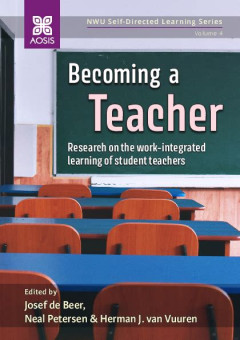
Becoming a Teacher
This book presents original research on learning through practical experience in pre-service teacher education. It reveals the student-teaching practicum—also known as work-integrated learning (WIL)—as the pivotal "elephant in the room," where theory meets real teaching environments
- Edition
- Volume 4
- ISBN/ISSN
- 978-1-928523-36-9
- Collation
- 472 page
- Series Title
- -
- Call Number
- 370.1
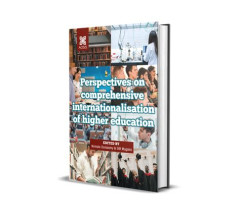
Perspectives on comprehensive internationalisation of higher education
This open‑access volume argues that internationalisation in higher education must be competitive, sustainable, and contribute meaningfully to both local and global educational development. It explores how higher education institutions (HEIs) balance economic imperatives—such as rankings, revenue from international student enrolment, and recruitment of top researchers—with educational goal…
- Edition
- -
- ISBN/ISSN
- 978-1-77995-211-0
- Collation
- 326 page
- Series Title
- -
- Call Number
- 371
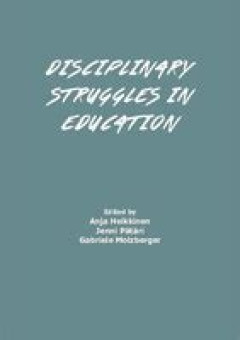
DISCIPLINARY STRUGGLES IN EDUCATION
This edited volume examines "disciplinary struggles" in education through three intertwined perspectives. The first section explores how educational practices and institutions are inherently disciplinary in nature.
- Edition
- -
- ISBN/ISSN
- 978-952-359-002-1
- Collation
- 264 page
- Series Title
- -
- Call Number
- 370.1

Theorising Curriculum in Unsetting Times In African Higher Education
Curriculum lies at the core of education and higher learning, yet its study and practice grow more complex amid global challenges. This volume explores how African universities navigate curriculum in the context of COVID-19, calls for decolonisation, and the Fourth Industrial Revolution. Featuring contributions from leading scholars, it examines the tensions between traditional, Eurocentric edu…
- Edition
- -
- ISBN/ISSN
- 978-1-7764606-1-8
- Collation
- 350 page
- Series Title
- -
- Call Number
- 370.375
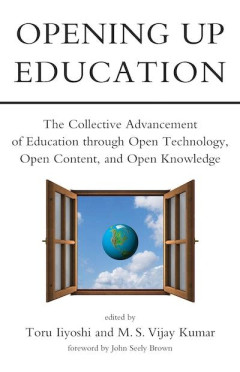
Opening Up Education
A collection of essays by leading experts explores how open education—encompassing open technology, content, and knowledge—can fundamentally shift the economics and dynamics of learning. Drawing on diverse initiatives—from courseware and simple games to open-source platforms—contributors highlight the untapped potential of shared educational resources. They call for not just technical i…
- Edition
- -
- ISBN/ISSN
- 978-0-262-03371-8
- Collation
- 500 page
- Series Title
- -
- Call Number
- 370
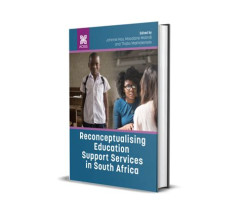
Reconceptualising Education Support Services in South Africa
Since inclusive education was introduced in South Africa in 2001, its success has depended on robust support services for both learners and teachers facing barriers. This book examines support systems at multiple levels—school-based teams, district-based teams, and special/full-service schools—highlighting their current fragmented implementation across the country.
- Edition
- -
- ISBN/ISSN
- 978-1-77634-205-1
- Collation
- 454 page
- Series Title
- -
- Call Number
- 371.2
 Computer Science, Information & General Works
Computer Science, Information & General Works  Philosophy & Psychology
Philosophy & Psychology  Religion
Religion  Social Sciences
Social Sciences  Language
Language  Pure Science
Pure Science  Applied Sciences
Applied Sciences  Art & Recreation
Art & Recreation  Literature
Literature  History & Geography
History & Geography